Kalona, naturally
In southeast Iowa, the Amish find common ground with those who value a grassroots lifestyle.
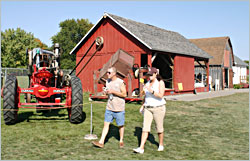
© Beth Gauper
Around Kalona, Iowa, there's one group of people who always have understood sustainable agriculture and locally sourced food.
For the Amish, that's a lifestyle, not a movement.
Since 1846, Old Order Amish have lived and worked in this bucolic pocket of southeast Iowa, 20 minutes from Iowa City.
They don't use electricity, natural gas or plumbing. They don't look in mirrors or wear bright colors.
And yet, each year the Amish look more and more on-trend. They're naturally green, and the small-batch artisan goods they produce — from pasture-raised eggs to handmade quilts — are in high demand.
"People love to drive around to all their little country shops," says Nancy Roth, who leads tours of Amish and Mennonite farms and businesses. "It's a fascination for everybody."
The willingness of many people to pay a premium for high-quality or organic products has provided a much-needed niche for the enterpreneurial Amish, who can't afford to buy more farmland for their many sons because developers also want it.
The proximity of Iowa City is a blessing and a curse. Though it's put pressure on land prices, the college town is a source of the kind of people who appreciate a grassroots lifestyle.
Not only do they come to buy, they often move to the area. New residents have started the Kalona SuperNatural brand of organic dairy goods and the Kalona Brewing Company, in an old tractor dealership downtown.
Kalona is a melting pot of people, from the ultra-pious to the progressive.
At the rural Community Country Store, women in white muslin prayer caps and long dresses of navy and dark green share the narrow aisles with the worldly shoppers who drive in from Iowa City.
For those fascinated by the Amish lifestyle, which rejects vanity and materialism, a walk through this general store is a lesson in itself.
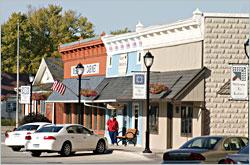
© Beth Gauper
Overhead are hooks on which kerosene lamps are hung at dusk. On the shelves are open boxes of the utilitarian goods found in general stores a century ago — shoehorns, thimbles, socks-plus baked goods, wooden toys and bins of flour and other bulk goods.
Prices are low, set to be within reach of the families who work the land nearby. Around Kalona, it's piety that's important, not profit.
This Amish community is the oldest in Iowa and one of the largest west of the Mississippi.
Here, the 19th century never faded into history. Or even the 16th century — the Amish, who believe in a literal interpretation of the Bible, are direct descendants of the Anabaptists, a Swiss group that believed Martin Luther and the other leaders of the Protestant Reformation didn't go far enough in returning the church to Scripture.
Not all of the Amish lead a strictly conservative lifestyle. New Order Amish can use rubber tires on their horse-drawn buggies, and the Beachy Amish may drive cars — black ones — and use cell phones.
And even within each Old Order community, the bishop can choose to relax rules on a case-by-case basis.
Mennonites, who compose perhaps half of the town of 2,400, lead a relatively modern lifestyle, though many retain conservative values. They, too, descend from the Anabaptists, and many are the children or grandchildren of Old Order Amish.
This rich Old World heritage has made a tourist attraction out of downtown Kalona. People come to gape at the Amish and their buggies and then duck into antiques and gift shops.
Two dozen shops sell quilts, dried flowers, pottery, fudge, dolls and various collectibles, though they all close on Sunday for the Sabbath.
Among collectors, Kalona is best-known for its quilts. In April, the Kalona Quilt Show & Sale draws thousands of people from all over the country.
Marilyn Woodin started Woodin Wheel, the show sponsor, and her personal collection of hundreds of quilts made between 1820 to 1940 is stored in the Kalona Quilt and Textile Museum.
"We're very into helping people see these quilts as American women's art," she says.
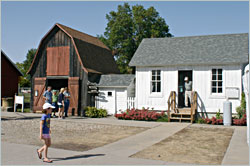
© Beth Gauper
The best way to get to know the Amish and Mennonite culture of Kalona is by taking one of the tours offered by the Kalona Historical Society.
The first half-hour, over coffee and doughnuts, is devoted to straightening out the difference between Amish and Mennonites.
Usually, someone will ask where the Amana Colonies, 30 miles to the north, figure in.
They don't — though the people of the Amanas also are German-speaking religious separatists, they're offshoots of Lutherans and had a communal lifestyle until they abandoned it in 1932.
Though the Amish cooperate with each other, they've never been communal.
The tour continues with demonstrations, such as rug-weaving or cheese-making, and a meal in an Amish/Mennonite home, where organic meats, egg noodles, tapioca pudding and apple butter are specialties.
There's a visit to the Kalona Historical Village, an open-air museum of 13 buildings that includes an 1897 country store, a schoolhouse, a post office and the 1879 railroad depot around which the downtown grew.
The Iowa Mennonite Museum at the village is Kalona's heirloom attic. Old tin toys, milk-glass dishes and 150-year-old quilts are labeled with family names; Yoder and Miller are so common the postmaster can't deliver mail without a middle name.
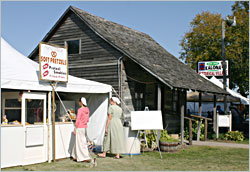
© Beth Gauper
In another corner is an 1881 treadmill, on which dogs or goats ran to pump water or separate milk. The treadmill, along with an outdoor bread oven and other antique equipment, is pressed into service once a year, at the Kalona Fall Festival.
That's the town's biggest event, with food a major draw: homemade ice cream, soft pretzels, cinnamon rolls, ribs on a stick, biscuits and gravy and chocolate-chip cookies with milk.
Like most everything else made in Kalona, it's delicious, down-home and good for you.
Trip Tips: Kalona, Iowa
Getting there: Kalona is 20 miles south of Iowa City and Interstate 80.
What to know: No tours or public events are held on Sunday, the day for worship and family.
Most Amish businesses also are closed on Tuesdays. Do not photograph the Amish, and ask before you photograph any part of their home or farm.
For more about Amish lifestyles, see Amish country.
Events: Quilt Show & Sale, last Thursday-Saturday of April. Kalona Fall Festival, last Friday-Saturday of September.
Check for music festivals and crafts and antiques shows.
Tours: Kalona Historical Tours offers 1½-hour minibus tours Monday-Saturday from April 15 to Oct. 31. Stops may include an Amish country store, cheese factory and woodworking shop.
It also offers full- and half-day tours that include a selection of stops and a family-style meal in a conservative Mennonite home. At least 12 people are required.
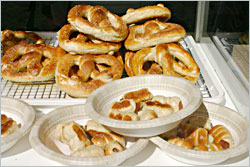
© Beth Gauper
Shopping: There are many small country businesses. In addition to the Community Country Store, the Pine Ridge Variety store, Stringtown Grocery, Golden Delight Bakery and Kalona Cheese Factory are popular stops.
Downtown, the Kalona General Store carries Amish goods, including cashew crunch, known as "the Amish crack."
Kalona Historical Village: The 13-building complex is open Monday through Saturday, 10 a.m. to 5 p.m. April through October and 11 a.m. to 3 p.m. November through March.
Admission is $12 for adults, $3 for children 7-12.
Accommodations: There are many good places to stay in Iowa City.
Dining: Kalona Brewing Company on B Avenue downtown serves wood-oven pizzas, grass-fed burgers, sandwiches, tapas and vegetarian items, plus its own beers.
Information: Kalona tourism, 319-656-3232.